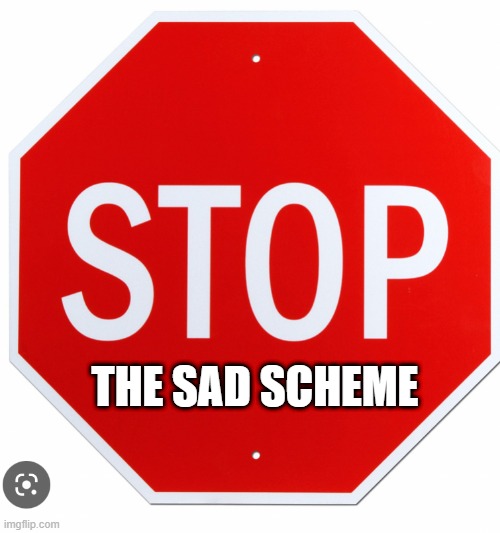Misjoinder Dooms SAD Scheme Patent Case–Wang v. Schedule A Defendants
35 U.S.C. § 299 limits joinder in patent cases to defendants who infringe using “the same accused product or process.” Congress enacted this requirement to restrict patent trolls who were filing lawsuits against defendants who had nothing in common but the allegation that they were infringing the same patent.
 Section 299 should cast a long shadow over SAD Scheme patent cases, which routinely attempt to join defendants who are engaging in parallel but independent acts of alleged infringement–exactly what Section 299 doesn’t permit. Indeed, if judges reliably raised Section 299 objections in SAD Scheme patent cases sua sponte, I think SAD Scheme patent cases would simply not exist.
Section 299 should cast a long shadow over SAD Scheme patent cases, which routinely attempt to join defendants who are engaging in parallel but independent acts of alleged infringement–exactly what Section 299 doesn’t permit. Indeed, if judges reliably raised Section 299 objections in SAD Scheme patent cases sua sponte, I think SAD Scheme patent cases would simply not exist.
We recently saw how Judge Pacold used Section 299 to cause a SAD Scheme patent case to fall apart. (Note: I have previously criticized Judge Pacold for providing online SAD Scheme templates that encourage plaintiffs to make factually threadbare filings). The plaintiff alleged that the defendants’ dining chairs or barstools infringed two of plaintiff’s design patents. It was obvious that the defendants’ products were not the “same” product:
although many of the defendants’ barstools share some common features, there are numerous substantial differences between them. Perhaps most significantly, although many of the defendants’ barstools exhibit some similarity in the design of the seat and backrest, the bases of many of the barstools vary widely. Some of the barstools have legs; others are supported by a single, central column with a wide base. Even considering only the barstools with legs or only the barstools with a central column, the bases of the barstools within each subcategory still vary with respect to their width, height, materials, and shapes. Even narrowing the court’s examination to just those barstools with a central column that appear to have a swiveling capability, some differences remain—such as the presence, placement, or shape of either a footrest or what looks to be a handle for adjusting the height of the barstool. Moreover, in addition to these more obvious differences in the bases of the barstools, even the seats and backrests of some barstools appear to contain some variances in the amount of cushioning present, the size of the backrest and seat, and possibly the materials used in the construction of the barstools.
These points are well-taken, but Section 299 shouldn’t require this kind of complicated fact analysis. The plaintiff has the burden of explaining how the defendants’ products are all the same, not similar. Thus, the judge adds that even if some of the accused items fully embody all of the patent claims, the statute specifies that doesn’t mean they are the same product. This is not a hard call.
This misjoinder dictates either dismissal of the misjoined parties or severance where the plaintiff has to pay the filing fees for each severed action. The judge gives the plaintiff the choice between these options. Given that plaintiffs often need the filing fee savings to make SAD Scheme cases cost-effective, I expect this lawsuit to dissolve completely.
Because the cases conflict with Congress’ express directions, I hope other judges will vigorously police Section 299 when confronted with SAD Scheme patent cases, even if the defendants aren’t around to raise the issue. Furthermore, statutorily extending Section 299 to cover trademark and copyright cases would almost certainly permanently end all SAD Scheme cases.
Case Citation: Wang v. Schedule A Defendants, No. 24-cv-759 (N.D. Ill. April 24, 2024)
Prior Blog Posts on the SAD Scheme
- Judge Hammers SEC for Lying to Get an Ex Parte TRO–SEC v. Digital Licensing
- Judge Reconsiders SAD Scheme Ruling Against Online Marketplaces–Squishmallows v. Alibaba
- N.D. Cal. Judge Pushes Back on Copyright SAD Scheme Cases–Viral DRM v. YouTube Schedule A Defendants
- A Judge Enumerates a SAD Scheme Plaintiff’s Multiple Abuses, But Still Won’t Award Sanctions–Jiangsu Huari Webbing Leather v. Schedule A Defendants
- Why Online Marketplaces Don’t Do More to Combat the SAD Scheme–Squishmallows v. Alibaba
- SAD Scheme Cases Are Always Troubling–Betty’s Best v. Schedule A Defendants
- Judge Pushes Back on SAD Scheme Sealing Requests
- Roblox Sanctioned for SAD Scheme Abuse–Roblox v. Schedule A Defendants
- Now Available: the Published Version of My SAD Scheme Article
- In a SAD Scheme Case, Court Rejects Injunction Over “Emoji” Trademark
- Schedule A (SAD Scheme) Plaintiff Sanctioned for “Fraud on the Court”–Xped v. Respect the Look
- My Comments to the USPTO About the SAD Scheme and Anticounterfeiting/Antipiracy Efforts
- My New Article on Abusive “Schedule A” IP Lawsuits Will Likely Leave You Angry
- If the Word “Emoji” is a Protectable Trademark, What Happens Next?–Emoji GmbH v. Schedule A Defendants
- My Declaration Identifying Emoji Co. GmbH as a Possible Trademark Troll


